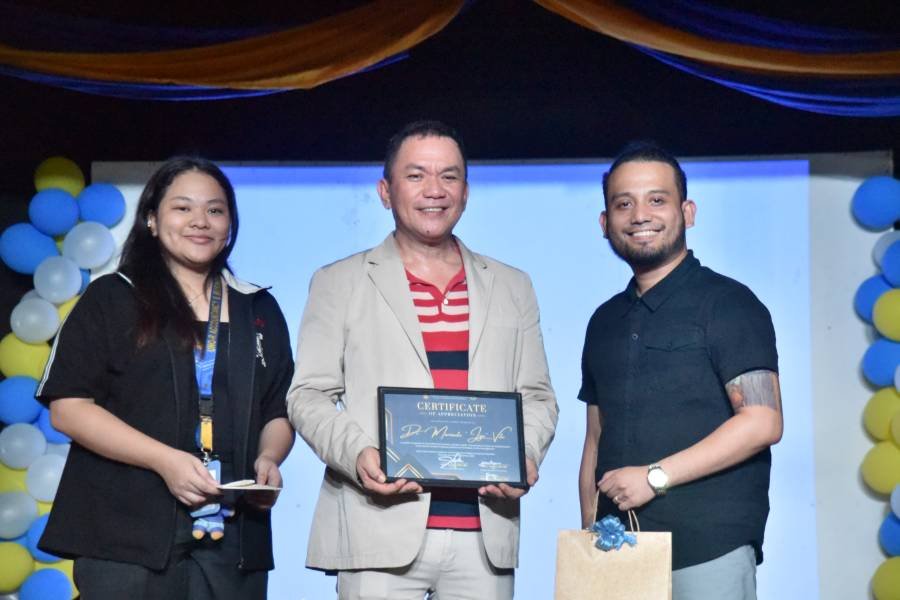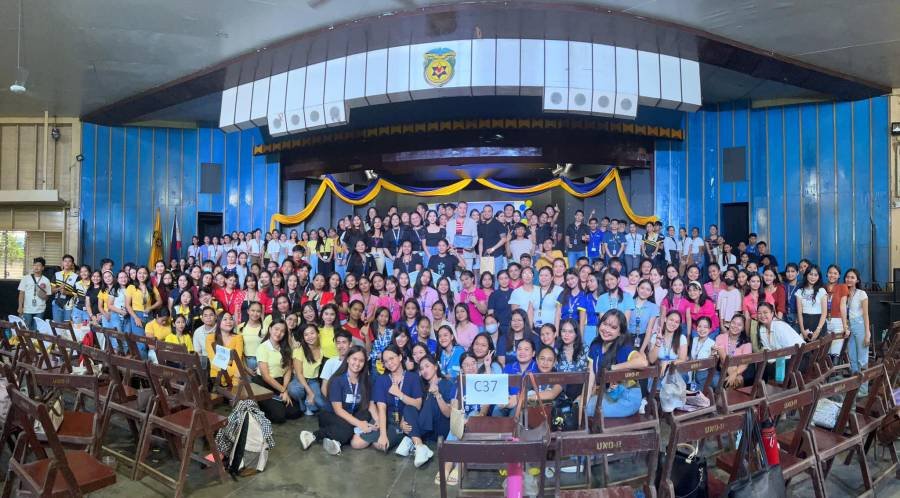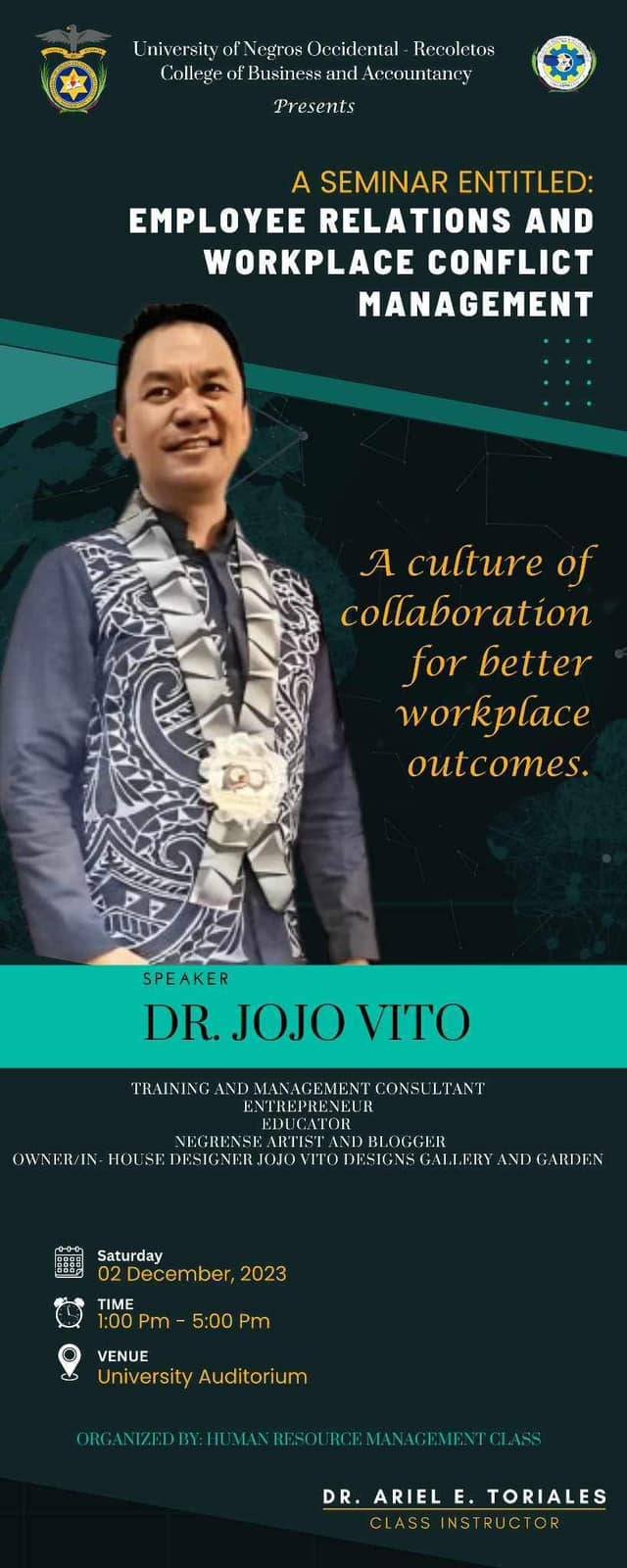
Employee Relations and Conflict Management: I take immense pride in standing shoulder to shoulder with my former student, now a Doctor of Business Management, as he forges a distinguished reputation for himself in the academic realm.
Table of Contents
The Dynamics of Employee Relations and Conflict Management: A Return to UNO-R
Recently, I had the privilege of returning to the University of Negros Occidental Recoletos (UNO-R), my alma mater, to address a gathering of more than 200 students from the College of Business Management and Accountancy. The occasion was centered around the pivotal topic of Employee Relations and Conflict Management, a subject integral to the curriculum of the Human Resource Management course. The invitation held a special significance for me, not only because it marked my return after a considerable period but also because UNO-R is where I earned my first degree in Psychology, completed the academic requirements for my Master in Public Administration (MPA), and was part of the pioneering batch of the Ph.D. in Business Management.

Undoubtedly, Dr. Toriales is immensely cherished by his students; his ability to connect with them through singing and relatability is truly remarkable.
Nostalgic Moments
As I stepped onto the familiar campus grounds, memories of my college years flooded back. The buildings, the corridors – they seemed frozen in time, preserving the essence of the vibrant student life I once knew. The talk, hosted in the same old auditorium that witnessed numerous events during my college years, added a layer of nostalgia to the occasion.
Dr. Ariel Toriales, the professor who extended the invitation, was not just an academic colleague but a former student during his MBA and DBA journey. Witnessing his success and contributions to academia filled me with pride and joy. It was evident that the event was meticulously planned, and Dr. Toriales, along with his team, executed it flawlessly.

The Warm Reception at the Employee Relations and Conflict Management Seminar
The warmth of the reception extended beyond the memories and into the atmosphere of the auditorium. The students, under Dr. Toriales’ guidance, exhibited commendable discipline and organization. Despite the warmth inside, their hospitality and cooperation made the experience delightful. As I began my talk in familiar surroundings, I felt a deep connection with the audience.

Highlights of the Talk | Employee Relations and Conflict Management
Now, let me share some key highlights from my discussion on Employee Relations and Conflict Management. These insights can be valuable not only to students but also to professionals navigating the complex landscape of workplace dynamics.
- Understanding Employee Relations: Employee relations are the cornerstone of a healthy work environment. I emphasized the importance of fostering positive relationships between employers and employees. This involves open communication, mutual respect, and a commitment to addressing concerns promptly.
- Effective Communication: Communication is the bedrock of any successful organization. I discussed the significance of clear, transparent communication in preventing conflicts. Encouraging an environment where employees feel heard and valued fosters a sense of belonging and reduces the likelihood of misunderstandings.
- Conflict Resolution Strategies: Conflicts are inevitable in any workplace, but their resolution is crucial for maintaining harmony. I delved into various conflict resolution strategies, emphasizing the importance of addressing issues early, objectively, and collaboratively. Techniques such as mediation, negotiation, and team-building activities were explored.
- Promoting a Positive Work Culture: A positive work culture is a powerful antidote to workplace conflicts. I highlighted the role of leadership in creating an inclusive and supportive atmosphere. By promoting a culture of trust, recognition, and fairness, organizations can mitigate potential conflicts and enhance employee satisfaction.
- Building Emotional Intelligence: Emotional intelligence is a key competency in navigating workplace relationships. I discussed the significance of self-awareness, empathy, and effective interpersonal skills in building strong employee relations. Developing emotional intelligence not only aids individual growth but contributes to a more collaborative work environment.

Employee Relations and Conflict Management
Returning to UNO-R was a nostalgic journey, and the opportunity to share insights on Employee Relations and Conflict Management was both gratifying and enriching. As the academic community at UNO-R continues to thrive, I am confident that the students, under the guidance of dedicated educators like Dr. Ariel Toriales, will contribute positively to the ever-evolving landscape of employee relations in the professional world.

More Stories
- 25 THINGS TO DO IN CAMBODIA | TOURIST SPOTS
- Service Problems of CENECO: A Call for Change and Progress
- Landers Superstore Bacolod | Biggest in the Philippines
- GREEN ENERGY: MORE Power’s Model, Hope for Negros
- Repurposing Your Old Clothes: From Old to Gold
- Power Watch Negros Advocates for Transparent Bill Deposits
- SOLO TRAVEL | Reasons, Benefits, Fears, Rewards, Tips
- Fabulous at 50: A Journey of Celebrations, Giving, and Joyful Memories
- Stress Management: Recognizing Symptoms, Mastering the Techniques
- The Imminent Revolution of the Power Landscape in Negros About to Happen
- Marketinglandia 2023: A Creative Triumph in Condo Living
- Revolutionizing Power: NEPC Franchise Gets Congress Approval
- Employee Relations and Conflict Management
- Sunken Cemetery: Embarking on Timeless Discoveries












The students really enjoyed and learned a lot from your talk, Doc Jojo. We hope to see you again in our future trainings. Thank you